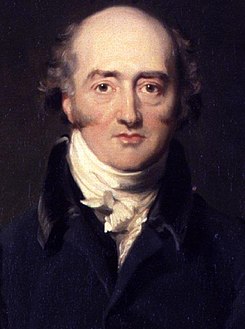George Canning
|
The Right Honourable George Canning FRS |
|
|---|---|
 |
|
| Prime Minister of the United Kingdom | |
|
In office 10 April 1827 – 8 August 1827 |
|
| Monarch | George IV |
| Preceded by | The Earl of Liverpool |
| Succeeded by | The Viscount Goderich |
| Chancellor of the Exchequer | |
|
In office 10 April 1827 – 8 August 1827 |
|
| Preceded by | Frederick John Robinson |
| Succeeded by | John Charles Herries |
| Secretary of State for Foreign Affairs | |
|
In office 13 September 1822 – 20 April 1827 |
|
| Prime Minister | The Earl of Liverpool |
| Preceded by | The Marquess of Londonderry |
| Succeeded by | The Viscount Dudley and Ward |
|
In office 25 March 1807 – 11 October 1809 |
|
| Prime Minister | The Duke of Portland |
| Preceded by | Viscount Howick |
| Succeeded by | The Earl Bathurst |
| Leader of the House of Commons | |
|
In office 13 September 1822 – 20 April 1827 |
|
| Prime Minister | The Earl of Liverpool |
| Preceded by | The Marquess of Londonderry |
| Succeeded by | William Huskisson |
| President of the Board of Control | |
|
In office 1816–1821 |
|
| Prime Minister | The Earl of Liverpool |
| Preceded by | The Earl of Buckinghamshire |
| Succeeded by | Charles Bathurst |
| Treasurer of the Navy | |
|
In office 10 May 1804 – 23 January 1806 |
|
| Prime Minister | William Pitt the Younger |
| Preceded by | George Tierney |
| Succeeded by | Richard Brinsley Sheridan |
| Personal details | |
| Born |
11 April 1770 Marylebone, Middlesex, London, England |
| Died | 8 August 1827 (aged 57) Chiswick, Middlesex, London, England |
| Political party | Tory |
| Spouse(s) | Joan Scott (m. 1800) |
| Children | 4 |
| Alma mater | Christ Church, Oxford |
| Religion | Church of England |
George Canning, PC, FRS (11 April 1770 – 8 August 1827) was a British statesman and Tory politician who served in various senior cabinet positions under numerous Prime Ministers, before himself serving as Prime Minister for the final four months of his life.
The son of an actress and a failed businessman and lawyer, Canning was supported financially by his uncle Stratford, allowing him to attend Eton College and Christ Church, Oxford. Canning entered politics in 1793 and rose rapidly. He was Paymaster of the Forces (1800–01) and Treasurer of the Navy (1804–06) under William Pitt the Younger. Canning was Foreign Secretary (1807–09) under the Duke of Portland, who was ill. Canning was the dominant figure in the cabinet and directed the seizure of the Danish fleet in 1807 to assure Britain's naval supremacy over Napoleon. In 1809, he was wounded in a duel with his foe Lord Castlereagh and was shortly thereafter passed over as a successor to the Duke of Portland in favour of Spencer Perceval. He remained out of high office until after Perceval was assassinated in 1812.
Canning subsequently served under new Prime Minister the Earl of Liverpool as British Ambassador to Portugal (1814–16), President of the Board of Control (1816–21), and Foreign Secretary and Leader of the House of Commons (1822–27). The King disliked Canning and there were efforts to frustrate his foreign policies. Canning, however, successfully built wide public support for his policies. Historian Paul Hayes argues that he scored major achievements in diplomatic relations regarding Spain and Portugal, by helping to guarantee the independence of the American colonies of Portugal (i.e. Brazil) and Spain. His policies ensured a major trading advantage to British merchants and supported the American's Monroe Doctrine.
...
Wikipedia
